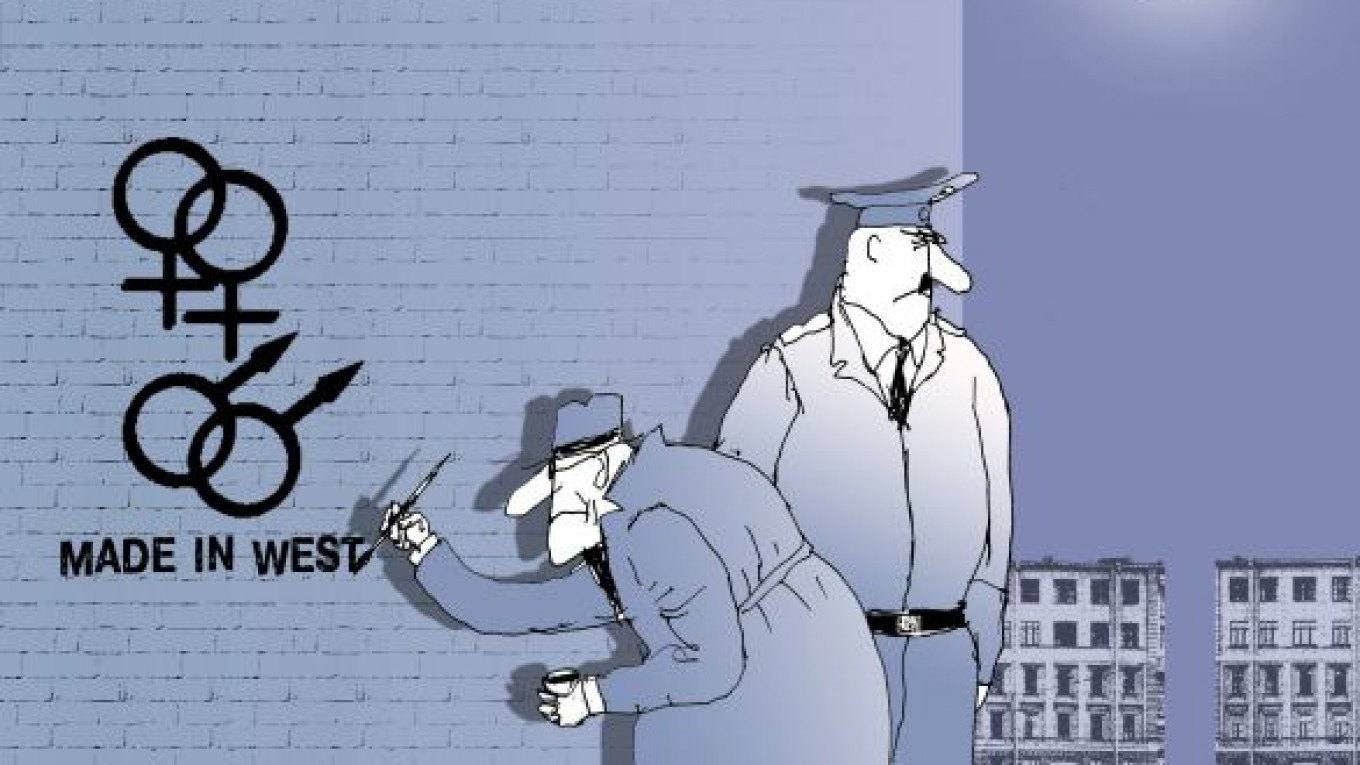Russian authorities have begun targeting their wrath at homosexuals.
A bill has been introduced to the State Duma that would ban information advocating homosexuality that is aimed at minors. The initiative was introduced by lawmakers from Novosibirsk, while similar or harsher laws have already been adopted in a number of regions. In St. Petersburg, the most recent to pass such a law, the ban applies to information aimed at adults as well as minors.
The federal legislation is expected to pass by an overwhelming majority, perhaps even unanimously. Few politicians in Russia would dare to oppose such an initiative, reflecting the general intolerance of homosexuality in society. According to polls conducted by the Levada Center over the past decade, about one-third of Russians consider homosexuality to be an illness or the result of psychological trauma. Another one-third see it as a bad habit and manifestation of sexual promiscuity.
The federal bill in its current form is actually not as restrictive as it might have been given the prevailing anti-gay attitudes in society. The only punishment it requires is a fine, although it is formidable at more than $10,000. The bill does not stipulate criminal charges against violators, although many Duma deputies probably would have supported such a provision.
The introduction of legislation aimed at homosexuality was expected. The ruling elite has been searching for a long time for initiatives that would please public opinion and show that Russia is undergoing "a spiritual and moral revival," co-opting several ideas from Russian nationalists in the process.
The authorities' fight against the "perversion and promiscuity" of homosexuality also carries a distinct anti-Western undertone. There is an implicit assumption that homosexuality is something harmful and alien that was brought to Russia by Western liberals. Kremlin spin doctors, who have turned the very idea of Western liberalism into a negative concept symbolizing the betrayal of Russia's national interests, now also associate the term with "pernicious homosexuality."
According to their theory, the idea of holding gay pride parades and promoting other elements of gay culture was foisted onto Russia by Western liberals. They are trying to export alien, immoral values and undermine the moral foundations of the Russian state.
The private sexuality of Soviet citizens was subject to government control if it was considered "nontraditional." But this practices goes back further than the Soviet period. In tsarist Russia, homosexuals were sentenced to hard labor in Siberia.
When the Bolsheviks came to power in 1917, they decriminalized homosexuality, and in the early 1920s they permitted abortions. In this regard, the Bolsheviks were probably following the example of their idols at the time — French Jacobins who ended the criminal prosecution of gays during the French Revolution, as well as German Social Democrats who idolized feminists Clara Zetkin and Rosa Luxemburg as being homegrown champions of the rights of sexual minorities.
Josef Stalin imposed criminal liability for homosexuality in 1934, with sentences ranging from two to eight years. He also prohibited abortion in 1936, and this law lasted until 1947. In a strange twist, much of Stalin's homophobic propaganda was linked to anti-fascist sentiment. Soviet propagandists exploited the homosexual tendencies among Nazi leaders such as Ernst Rohm. But German leader Adolf Hitler himself later justified punishing Rohm as part of his fight against homosexuality both within his ranks and in countries that Nazi troops occupied.
Soviet authorities convicted about 1,000 people each year on charges of homosexuality. It was common for homosexuality charges to be brought against prominent cultural figures when they were outspoken critics of the political system Perhaps the most striking example of this was when Georgian painter and filmmaker Sergei Paradzhanov was sentenced to five years of hard labor.
The anti-gay law was removed from the Criminal Code in 1993, while medical diagnosis categorizing homosexuality as a mental disorder was abolished only six years later, in 1999.
Although it would be difficult for today's rulers to reinstate such severe anti-gay practices now, it seems that they are using the current legislation to position themselves as defenders of traditional "Russian spirituality and morality." If nothing else, the fight against homosexuals deflects attention away from the real enemy of Russia that the authorities have no interest in fighting — corruption.
Georgy Bovt is a political analyst.
A Message from The Moscow Times:
Dear readers,
We are facing unprecedented challenges. Russia's Prosecutor General's Office has designated The Moscow Times as an "undesirable" organization, criminalizing our work and putting our staff at risk of prosecution. This follows our earlier unjust labeling as a "foreign agent."
These actions are direct attempts to silence independent journalism in Russia. The authorities claim our work "discredits the decisions of the Russian leadership." We see things differently: we strive to provide accurate, unbiased reporting on Russia.
We, the journalists of The Moscow Times, refuse to be silenced. But to continue our work, we need your help.
Your support, no matter how small, makes a world of difference. If you can, please support us monthly starting from just $2. It's quick to set up, and every contribution makes a significant impact.
By supporting The Moscow Times, you're defending open, independent journalism in the face of repression. Thank you for standing with us.
Remind me later.







